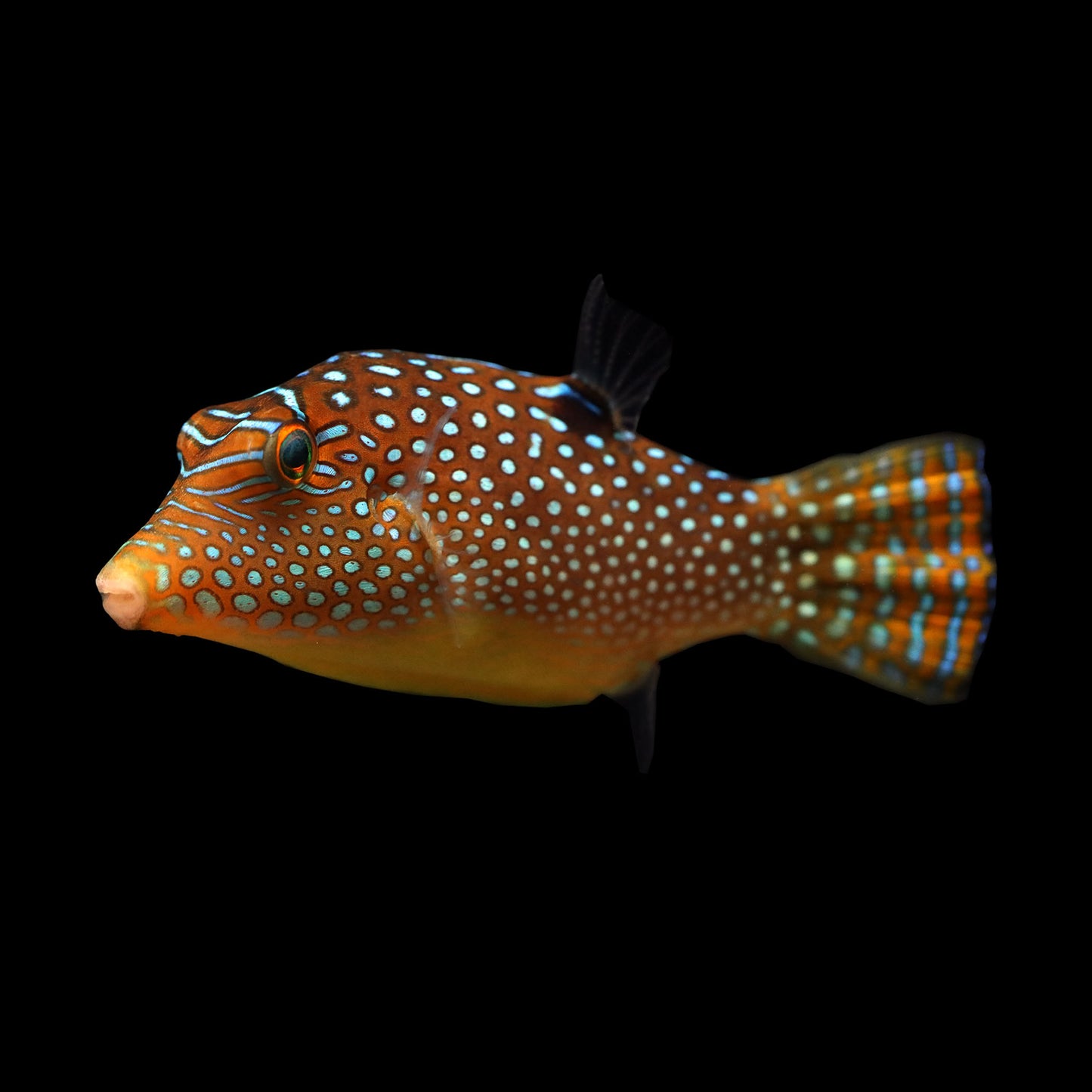AQUARIUM ARTS
Fiji Orange Tail Puffer (Canthigaster janthinoptera)
Fiji Orange Tail Puffer (Canthigaster janthinoptera)
Couldn't load pickup availability
Fiji Orange Tail Puffer (Canthigaster janthinoptera)
Discover the Unique Fiji Orange Tail Puffer
The Fiji Orange Tail Puffer is a captivating and distinctive species known for its bold personality, vibrant colors, and fascinating behavior. These small but striking fish add a unique and colorful presence to any saltwater aquarium. Ideal for both novice and experienced aquarists, the Fiji Orange Tail Puffer makes a great addition to fish-only setups where its curious nature can truly shine.
Appearance: The Fiji Orange Tail Puffer stands out with its eye-catching appearance. It features a predominantly blue-gray body speckled with small white or light blue spots, which contrasts beautifully with its bright orange tail. The fish’s compact, boxy shape and expressive face give it a lot of character, making it a favorite among marine enthusiasts. Its vivid orange tail is a key identifier and adds a burst of color to any tank.
Behavior: Fiji Orange Tail Puffers are known for their active and curious behavior. They are constantly exploring their surroundings and will interact with tank décor and inhabitants. While generally peaceful, they may display territorial behavior, especially in smaller tanks, and can nip at fins or invertebrates. These puffers are also famous for their ability to inflate themselves when threatened, a defense mechanism that helps ward off potential predators.
Diet: The Fiji Orange Tail Puffer is an omnivore and thrives on a varied diet that includes meaty foods. They enjoy frozen or fresh seafood such as squid, shrimp, and clams, as well as high-quality pellets and flakes. It is essential to include hard-shelled foods like clams on the half shell or snails to help them wear down their constantly growing teeth. A varied diet ensures they maintain their vibrant coloration and overall health.
Tank Requirements: Fiji Orange Tail Puffers require a minimum tank size of 50 gallons, providing enough space for them to swim freely and explore. Since these puffers are known to nip at corals and invertebrates, they are best suited for fish-only setups. The tank should be well-decorated with plenty of live rock, caves, and hiding spots to create a stimulating environment for their active lifestyle.
Tankmates: Fiji Orange Tail Puffers can be semi-aggressive and territorial, especially towards slow-moving or small fish. Suitable tankmates include larger, more robust species such as tangs, triggers, and angelfish. Avoid housing them with small, delicate fish or invertebrates that may be seen as prey. A well-sized tank with plenty of hiding spots will help minimize territorial disputes.
Reef Aquarium Compatibility: The Fiji Orange Tail Puffer is not considered reef-safe due to its tendency to nip at corals, sessile invertebrates, and small crustaceans. It is best kept in a fish-only aquarium where it can roam freely without causing harm to delicate reef organisms.
Max Size: The Fiji Orange Tail Puffer can grow up to 4 inches (10 cm) in length, making it a compact but colorful addition to any aquarium. Its small size and active personality make it an intriguing species to watch.
Origin: As the name suggests, the Fiji Orange Tail Puffer is commonly found in the waters around Fiji and other parts of the Indo-Pacific region.
Interesting Facts:
-
Fiji Orange Tail Puffers are known for their unique ability to inflate themselves when threatened, a behavior that helps deter predators.
-
These puffers have continuously growing teeth, so it’s important to provide hard-shelled foods to help wear them down.
-
Their bold personalities and curious nature make them an engaging and entertaining species to observe in a marine aquarium.
Disclaimer: Aquarium Arts cannot guarantee compatibility with your current fish or the fish you buy and cannot be held liable for fish lost due to aggression.
Share


